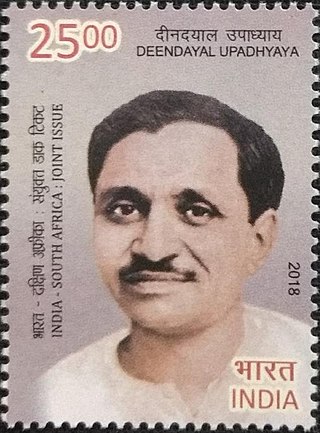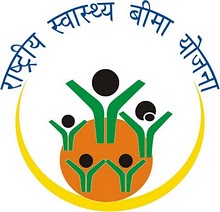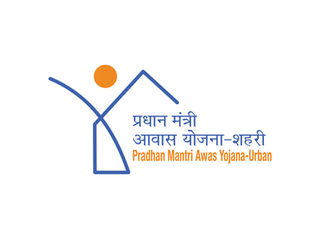| Deen Dayal Upadhyaya Grameen Kaushalya Yojana (DDU-GKY) | |
|---|---|
 | |
| Country | India |
| Prime Minister(s) | Narendra Modi |
| Launched | 25 September 2014 |
| Website | ddugky |
Grameen Kaushalya Yojana or DDU-GKY is a Government of India youth employment scheme. [1] [2]
| Deen Dayal Upadhyaya Grameen Kaushalya Yojana (DDU-GKY) | |
|---|---|
 | |
| Country | India |
| Prime Minister(s) | Narendra Modi |
| Launched | 25 September 2014 |
| Website | ddugky |
Grameen Kaushalya Yojana or DDU-GKY is a Government of India youth employment scheme. [1] [2]
DDU-GKY was launched on 25 September 2014 by Union Ministers Nitin Gadkari and Venkaiah Naidu on the occasion of 98th birth anniversary of Pandit Deendayal Upadhyaya. [3] The Vision of DDU-GKY is to "Transform rural poor youth into an economically independent and globally relevant workforce". It aims to target youth, in the age group of 15–35 years. DDU-GKY is a part of the National Rural Livelihood Mission (NRLM), tasked with the dual objectives of adding diversity to the incomes of rural poor families and cater to the career aspirations of rural youth. A corpus of ₹ 1,500 crore is aimed at enhancing the employability of rural youth. Under this programme, disbursements would be made through a digital voucher directly into the student’s bank account as part of the government's skill development initiative. [4] [5] [6]
The Sampoorna Grameen Rozgar Yojana was a scheme launched by the Government of India to gain the objective of providing gainful employment for the rural poor. From 21 February 2003, EAS became an allocation-based scheme. The programme was implemented through the Panchayati Raj institutions.

Deen Dayal Upadhyaya College (DDUC) is one of the top constituent college of the University of Delhi, Delhi, India. Located at Dwarka, Delhi near Netaji Subhas University of Technology. It is fully funded by Government of Delhi. It was established in August 1990 in the memory of Deen Dayal Upadhyaya, a philosopher, thinker and social worker.

REC Limited, formerly Rural Electrification Corporation Limited, is an Indian public sector company which finances and promotes power projects across India. It provides loans to Central/State Sector Power Utilities in the country, State Electricity Boards, Rural Electric Cooperatives, NGOs and Private Power Developers. It is a subsidiary of Power Finance Corporation (PFC) and is under the administrative control of the Ministry of Power, Government of India.

Deendayal Upadhyaya, known by the epithet Panditji, was an Indian politician, a proponent of integral humanism ideology and leader of the political party Bharatiya Jana Sangh (BJS), the forerunner of Bharatiya Janata Party (BJP). Upadhyaya started the monthly publication Rashtra Dharma, broadly meaning 'National Faith', in the 1940s to spread the ideals of Hindutva revival. Upadhyaya is known for drafting Jan Sangh's official political doctrine, Integral humanism, by including some cultural-nationalism values and his agreement with several Gandhian socialist principles such as sarvodaya and swadeshi (self-sufficiency).

Rashtriya Swasthya Bima Yojana is a government-run health insurance programme for the Indian poor. The scheme aims to provide health insurance coverage to the unrecognised sector workers belonging to the BPL category and their family members shall be beneficiaries under this scheme. It provides for cashless insurance for hospitalisation in public as well as private hospitals. The scheme started enrolling on April 1, 2008 and has been implemented in 25 states of India. A total of 36 million families have been enrolled as of February 2014. Initially, RSBY was a project under the Ministry of Labour and Employment. Now it has been transferred to Ministry of Health and Family Welfare from April 1, 2015

Pradhan Mantri Gramin Aawas Yojana is a social welfare programme under the Ministry of Rural Development, Government of India, to provide housing for the rural poor in India. A similar scheme for urban poor was launched in 2015 as Housing for All by 2022. Indira Awas Yojana was launched in 1985 by Rajiv Gandhi, the Prime Minister of India, as one of the major flagship programs of the Ministry of Rural Development to construct houses for the Below Poverty Line population in the villages.

The National Health Mission (NHM) was launched by the government of India in 2013 subsuming the National Rural Health Mission and National Urban Health Mission. It was further extended in March 2018, to continue until March 2020. It is headed by Mission Director and monitored by National Level Monitors appointed by the Government of India.Rural Health Mission (NRHM) and the recently launched National Urban Health Mission (NUHM). Main program components include Health System Strengthening (RMNCH+A) in rural and urban areas- Reproductive-Maternal- Neonatal-Child and Adolescent Health, and Communicable and Non-Communicable Diseases. NHM envisages achievement of universal access to equitable, affordable and quality health care services that are accountable and responsive to the needs of the people.
Pradhan Mantri Adarsh Gram Yojana (PMAGY) is a rural development programme launched by the central government in India in the financial year 2009–10 for the development of villages having a higher ratio of people belonging to the scheduled castes through convergence of central and state schemes and allocating financial funding on a per village basis.
Antyodaya Anna Yojana is the sponsored scheme of Government of India to provide highly subsidised food to millions of the poorest families. This scheme was developed by the then Union Food and Civil Supplies Minister, N Sri Vishnu. It was launched by the NDA government on 25 December 2000 and first implemented in the Indian state of Rajasthan.

Pandit Deen Dayal Upadhyaya Junction, formerly known as Mughalsarai Junction, is a railway station in the town of Mughalsarai in the Indian state of Uttar Pradesh. The station contains the largest railway marshaling yard in Asia. This yard caters to around 450–500 trains in a month. All trains, including premium category Vande Bharat, Rajdhani and Duronto trains, halt at this station, which makes it unique in the entire Indian Railways network. "Major installations in Mughalsarai include electric locomotive shed holding 147 locomotives, diesel locomotive shed holding 53 locomotives, wagon ROH shed, and a 169-bed divisional hospital."
The National Rural Livelihood Mission (NRLM) is a poverty alleviation project implemented by the Ministry of Rural Development, a branch of the Government of India. This plan is focused on promoting self-employment and the organization of rural poor. The idea behind this program is to organize the poor into Self Help Groups (SHGs) and make them capable of self-employment. In 1999, after restructuring the Integrated Rural Development Programme (IRDP), the Ministry of Rural Development (MoRD) launched Swarnajayanti Grameen Swarojgar Yojana (SGSY) to focus on promoting self-employment among the rural poor. SGSY is now remodelled to form NRLM, thereby plugging the shortfalls of the SGSY programme. This program was launched in 2011 with a budget of $5.1 billion and is one of the flagship programs of the Ministry of Rural Development. This is one of the world's most prominent initiatives to improve the livelihood of the poor. This program is supported by the World Bank with a credit of $1 Billion. The program was succeeded by Deen Dayal Antyodaya Yojana on 25 September 2015.
Deen Dayal Upadhyaya Antyodaya Yojana or DDUAY is one of the Government of India scheme for helping the poor by providing skill training. It replaces Aajeevik. The Government of India has provisioned ₹500 crore (US$60 million) for the scheme. The objective of the scheme is to train 0.5 million people in urban areas per annum from 2016. In rural areas the objective is to train 1 million people by 2017. Further, in urban areas, services like SHG promotion, training centres, vendors markets, and permanent shelters for homeless. The aim of the scheme is skill development of both rural and urban India as per requisite international standards.
Deen Dayal Upadhyaya Gram Jyoti Yojana is a Government of India scheme designed to provide continuous electricity supply to rural India. The government plans to invest ₹756 billion (US$9.1 billion) for rural electrification under this scheme. The scheme replaced the existing Rajiv Gandhi Grameen Vidyutikaran Yojana.

Pradhan Mantri Awas Yojana (PMAY) is a credit-linked subsidy scheme by the Government of India to facilitate access to affordable housing for the low and moderate-income residents of the country. It envisaged a target of building 2 crore (20 million) affordable houses by 31 March 2022. It has two components: Pradhan Mantri Awas Yojana(Urban) (PMAY-U) for the urban poor and Pradhan Mantri Awaas Yojana (Gramin) (PMAY-G and also PMAY-R) for the rural poor, the former administered by Ministry of Housing and Urban Affairs and the latter by Ministry of Rural Development. This scheme converges with other schemes to ensure that houses have a toilet, Saubhagya Scheme for universal electricity connection, Ujjwala Yojana LPG connection, access to drinking water and Jan Dhan banking facilities, etc.

Skill India or the National Skills Development Mission of India is a campaign launched by Prime Minister Narendra Modi. It is managed by the National Skills Development Corporation of India.

Pradhan Mantri Ujjwala Yojana was launched by Prime Minister of India Narendra Modi on 1 May 2016 to distribute 50 million LPG connections to women of Below Poverty Line (BPL) families. A budgetary allocation of ₹80 billion (US$960 million) was made for the scheme. The scheme was replaced by the Ujjwala Yojana 2.0 in 2021. Although the scheme has expanded access to clean cooking technologies, the use of polluting fuels remains common, particularly in rural India.

Ayushman Bharat Pradhan Mantri Jan Arogya Yojana is a national public health insurance scheme of the Government of India that aims to provide free access to health insurance coverage for low income earners in the country. Roughly, the bottom 50% of the country qualifies for this scheme. People using the program access their own primary care services from a family doctor and when anyone needs additional care, PM-JAY provides free secondary health care for those needing specialist treatment and tertiary health care for those requiring hospitalization.

Rajiv Gandhi Grameen Vidyutikaran Yojana (RGGVY) or Rural Electricity Infrastructure and Household Electrification Scheme was launched in 2005 with the aim to provide electricity to all rural areas.